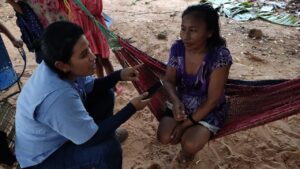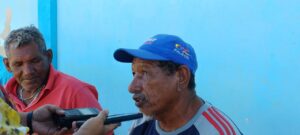Reported threats to withdraw social aid if residents do not vote in favor of the ruling party, and abandoned fishing villages and Indigenous communities in extreme poverty that call into question the effectiveness of the vote. These are some of the stories published as part of Mirador Electoral, a journalistic project that seeks to identify trends and challenges for the Venezuelan electorate.
Venezuela is in the middle of elections. In the last quarter of 2023, the opposition primaries and a consultative referendum were held. Presidential elections are scheduled for 2024 that will set the head of state from 2025 to 2031.
It’s in this context that Independent media outlets Efecto Cocuyo and Crónica Uno gave life to Mirador Electoral. The aim is to create “a space for political and electoral discussion,” Ibis León, journalist from Efecto Cocuyo and coordinator of Mirador Electoral, told LatAm Journalism Review (LJR).
“Mirador Electoral is a repository of different products. It is a project that includes the scenes behind the vote in the regions with a series of articles, but that also integrates 'la tía del WhatsApp,' a fictional character through which disinformation is combated. In addition, there are a series of in-depth interviews called Lado B,” León said.
In the Mirador Electoral series of articles, stories are told from 15 states in Venezuela, 10 from the so-called electoral corridor – due to the high population of voters who live there – and five from the so-called news deserts (areas where access to local information is insufficient.)

Crónica Uno correspondent, Mariela Nava, went into a Venezuelan indigenous community in extreme poverty that calls into question the effectiveness of the vote. (Photo: Crónica Uno / Efecto Cocuyo).
To reach the different corners of the country, the participation of Crónica Uno was essential since it is one of the few Venezuelan media outlets that has a network of correspondents at the national level. Journalists in the regions that collaborate with Efecto Cocuyo also participated.
“We work with journalists in the regions for a period of three to four months. First, we meet with each one to define the topic since each state has its particular shortcomings and problems. And then, between three editors, Ibis León, Edgar López and I, we divided the guidance we provided to the journalists,” Yohana Marra, journalist and editorial coordinator of Crónica Uno, told LJR.
According to the Press and Society Institute (IPYS, for its acronym in Spanish), at least 7 million Venezuelans (21% of the population) live in news deserts, making Venezuela fertile ground for disinformation, even more so in an electoral context.
“La tía del WhatsApp” (The aunt from WhatsApp), which is part of Mirador Electoral, emerged as a tool to counteract electoral disinformation. They are vertical videos published on Efecto Cocuyo’s TikTok account with the image of an older woman generated through the Stable Diffusion Artificial Intelligence (AI) model.
In each video, the older woman (the aunt) asks her nephew if the information she has received through WhatsApp is true or false. The nephew responds by providing facts and verified information.
“On TikTok, Efecto Cocuyo has had significant growth and we can reach a younger audience. For example, during the primaries, the location of the voting centers generated a lot of doubts due to the lack of technical assistance from the National Electoral Council, that is why we made a series of pieces to explain how to find your voting center,” León said.
The other audiovisual side of Mirador Electoral is Lado B, a series of interviews published on YouTube. Last year, interviews with primary candidates from the opposition were published here. The definitive list of candidates and the exact date for the 2024 presidential elections are still unknown.
Other features of Mirador Electoral are the stories produced from 15 different Venezuelan states.
Journalist Joanné López wrote a story for Mirador Electoral from the state of Falcón in northeastern Venezuela. Her investigation focused on the community of Río Seco, a fishing town that has been affected, for three years, by constant oil spills.
Thanks to water pollution, the community has lost its main livelihood: fishing. According to López’s article, residents seek to pressure the Venezuelan government through their votes.

The community of Río Seco is a fishing village in Venezuela that has been affected for the last three years by constant oil spills (Photo: Crónica Uno / Efecto Cocuyo).
“Participating in this project was a very gratifying experience because I had never dealt with environmental and political issues at the same time,” López told LJR. “Before the opposition primaries I began to investigate what the situation was like in this area and how this could affect this year's presidential elections. There I noticed that the community was more interested in obtaining compensation that they are entitled to due to the negligence of 38 oil spills by PDVSA [the state oil company],” she added.
For another article, Crónica Uno correspondent Mariela Nava, who works in the state of Zulia, entered an Indigenous community in the west of the country.
There, the Wayúu ethnic group lives with hunger and the violation of their rights. According to Nava’s article, politicians use this vulnerability to get their votes and, when they don't, they use retaliation such as restricting their social assistance.
“Since last year Crónica Uno has been in touch with this community, making visible the state in which the inhabitants of this parish live. From hunger to roads. Working in the political sphere was a challenge because getting people to reveal to you what is happening internally in the community and the corruption that exists is difficult,” Nava told LJR.
For Nava, it is crucial that media outlets such as Efecto Cocuyo and Crónica Uno join together to increase the visibility of these types of problems.
“Getting out of what media in Venezuela generally cover and delving into the real problems of the communities is what is important. Many times there, in those neighborhoods, there are very enriching stories that when told, changes are achieved,” she said.
León, as coordinator of the investigation, agrees with Nava. According to what she said, Efecto Cocuyo contacted Crónica Uno to do this project because it was interested in forming an alliance with a media outlet with a community focus. Furthermore, for León, the differentiating factor is the hyperlocal focus.
Both Crónica Uno and Efecto Cocuyo are blocked by Venezuelan Internet providers. However, that did not prevent the publication of some of the reports from having a significant impact on the communities mentioned in the stories.
According to Nava, after the publication of her article there was an uproar in the Indigenous community and the social aid that had been taken from them was returned.
“People have called me to thank me for bringing their problems to light,” the journalist said.
The project coordinators agree on the importance of addressing these hyperlocal issues and consider journalism to be a social service.
“It is nice to see results in an environment with as much opacity as the Venezuelan one. When they really value your journalistic work, you realize that it was worth mobilizing this team, it was worth taking all the security measures we took and, in general, it was worth all the effort,” Marra said.